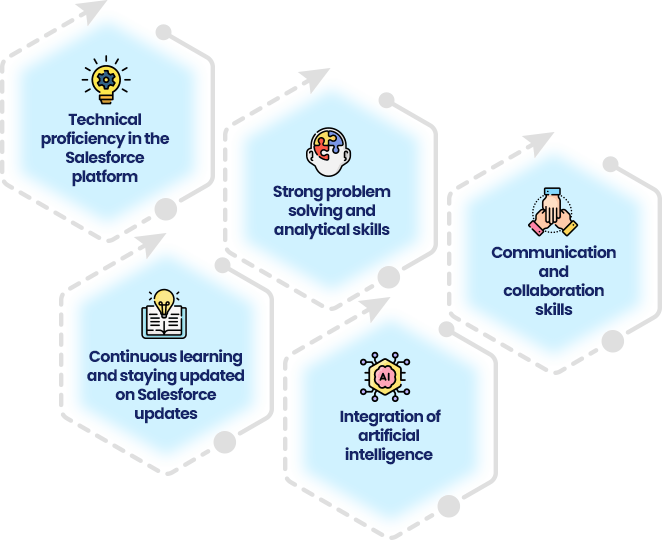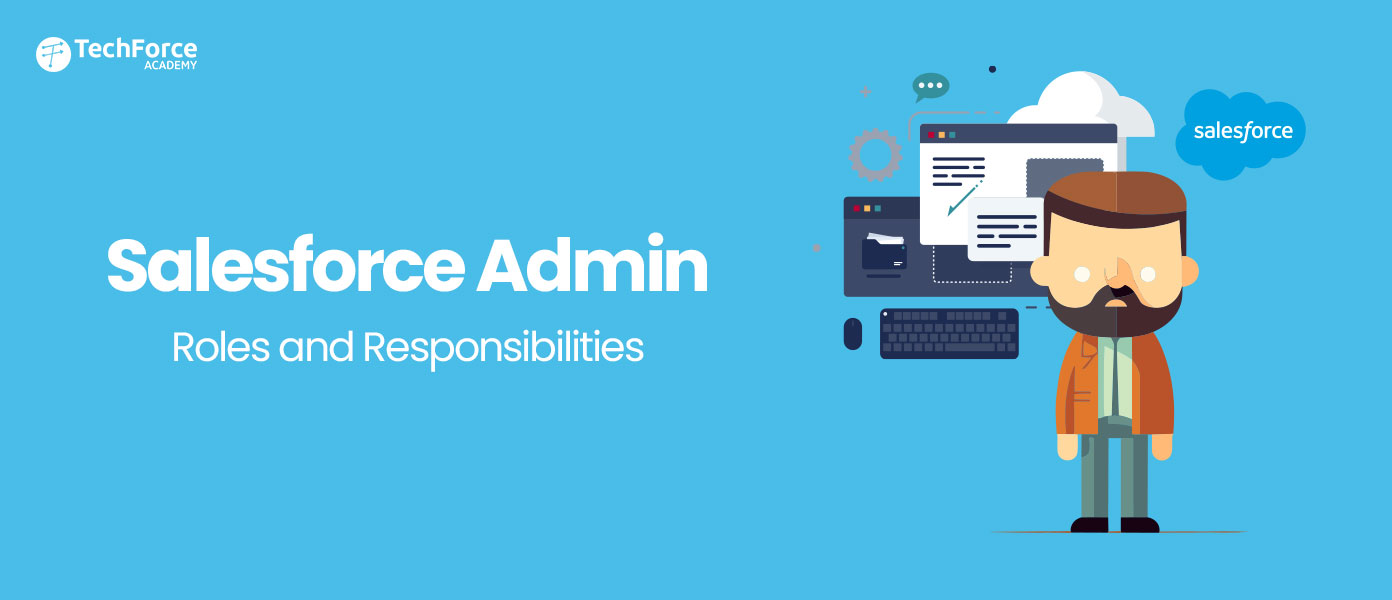What is a Salesforce Administrator?
As businesses leverage Customer Relationship Management (CRM) systems to streamline their processes, the need for skilled professionals who can navigate and optimise platforms like Salesforce is in high demand. Understanding the intricacies of a Salesforce Administrator job description becomes crucial in this scenario, as these professionals emerge as the keystone of organisations.
Picture them as the backstage maestros, expertly handling the Salesforce platform. Their job is to make sure everything runs seamlessly, from setting up user access to creating custom features.
These tech-savvy individuals wear many hats, skilfully configuring profiles and permissions and crafting workflows that make everything click. It’s not a solo act; they’re the ultimate collaborators, working hand-in-hand with sales, marketing, and customer service teams. Their goal? To understand what each team needs and use Salesforce magic to boost productivity and efficiency.
Essentially, these tech-savvy professionals are constructing a bridge between cutting-edge technology and the triumphant success of the business, making Salesforce Administrator jobs not just roles but essential keystones in the modern business landscape.
In this blog post, we will explore the Salesforce Administrator roles and responsibilities in an organisation, and their contribution to team success.
What does a Salesforce Administrator do? (Salesforce Admin roles and responsibilities)
1. Managing user access and security
One of the primary responsibilities of a Salesforce Administrator is ensuring the proper management of user access and maintaining data security. This involves creating and managing user profiles, implementing permission sets, and establishing data-sharing rules.
2. Customising and configuring Salesforce
Customisation lies at the core of a Salesforce Administrator’s tasks. This includes tailoring the platform to meet the unique needs of the business, whether it’s creating custom fields, page layouts, or developing custom applications.
3. Data management and maintenance
Effective data management is crucial for any organisation. Salesforce Administrators are responsible for data quality, ensuring accurate and up-to-date information while also managing data migration and integration tasks.
4. Automation of processes
Workflow rules and approval processes are powerful tools in the Salesforce Administrator’s toolkit. They help automate repetitive tasks, ensuring efficiency and consistency in business processes.
5. System integration
Connect Salesforce with other platforms, ensuring seamless data flow and integration across the organisation. Salesforce Administrators work closely with IT teams to establish and maintain integrations, allowing for a streamlined exchange of information between Salesforce and other systems.
6. Security measures
Implement robust user authentication, authorisation, and data encryption to protect sensitive information and prevent unauthorised access. Salesforce Administrators play a crucial role in establishing and enforcing security measures, ensuring that data is kept safe and confidential.
7. Generating and analysing reports and dashboards
Salesforce Administrators play a key role in providing actionable insights to business stakeholders. They create reports and dashboards, offering a visual representation of data that aids in decision-making processes.
8. Training and support
Fulfilling the Salesforce Administrator’s responsibilities involves providing user training and ongoing support for platform usage, ensuring that all employees can effectively utilise Salesforce and maximise its functionality. This includes conducting training sessions, creating user guides, and offering individualised support to address any issues or questions that may arise during the use of the platform.
What are the Skills required for a Salesforce Administrator?

1. Technical proficiency in the Salesforce platform: Being well-versed in the Salesforce platform is a fundamental requirement. This includes a deep understanding of the system’s architecture, data model, and various features.
2. Strong problem-solving and analytical skills: Salesforce Administrators often encounter complex issues that require effective problem-solving and analytical thinking. The ability to troubleshoot and find efficient solutions is paramount.
3. Communication and collaboration skills: Effective communication is crucial as Salesforce Administrators interact with various stakeholders. From understanding business requirements to explaining technical concepts, clear communication fosters collaboration.
4. Continuous learning and staying updated on Salesforce updates: The tech industry evolves rapidly, and Salesforce is no exception. Salesforce Administrators must commit to continuous learning to stay abreast of updates, new features, and best practices.
5. Integration of artificial intelligence: AI can automate repetitive tasks, provide valuable insights, and enhance the overall user experience. Salesforce Administrators should familiarise themselves with AI capabilities and explore ways to leverage them within their organisations to improve efficiency and drive innovation.
What is the importance of Salesforce Administrator certification?
Salesforce offers a range of courses and certification programs. The courses are designed to cater to different job roles and skill levels, while the certification programs specifically focus on validating a professional’s expertise in Salesforce Administrator job roles and skills. Certification not only demonstrates proficiency but also opens doors to advanced job opportunities and increased earning potential.
Employers often prioritise certified professionals due to their proven skills. According to a recent survey by Salesforce, job postings requiring Salesforce Administrator certification have increased by 30% in the past year. Additionally, certified professionals earn an average of 20% more than non-certified Salesforce professionals.
Student Testimonial – “Obtaining Salesforce Administrator certification not only enhanced my skills but also opened up new job opportunities that I would not have had otherwise. I highly recommend it to anyone looking to advance in their roles.” – Gowthami Vuda, Certified Salesforce Administrator
How to become a Salesforce Administrator?
1. Educational background and prerequisites: While a formal education in computer science or a related field is beneficial for aspiring Salesforce Administrators, it is not mandatory. This education provides a solid foundation in areas such as programming, data structures, and algorithms, which are important for understanding databases and cloud computing. For example, knowledge of programming languages and data structures can help administrators manipulate and analyse data within Salesforce systems.
2. Gaining practical experience: If you are aspiring to become a Salesforce Administrator, then you should proactively pursue internships, such as collaborating with local non-profit organisations to aid in the implementation and management of their Salesforce systems. Engaging in volunteer opportunities, like supporting Salesforce training sessions or participating in community events, can offer valuable hands-on experience. Furthermore, you can take on personal projects, such as constructing a small-scale Salesforce application, to acquire practical exposure to the platform.
3. Seeking Salesforce courses and certifications: Salesforce offers a range of courses and certifications, including Salesforce Administrator certification, Salesforce Developer certification, and Salesforce Consultant certification. These certifications validate an administrator’s skills and expertise in their respective areas. By completing Trailhead modules and projects, you can stay updated with the latest features and best practices in the Salesforce ecosystem.
4. Continuous learning and staying updated on Salesforce: Continuous learning and staying updated on Salesforce is a fundamental aspect of a Salesforce Administrator’s responsibilities. Salesforce regularly releases updates and new features, so it is important for administrators to stay informed and adapt their skills accordingly. This can be done through attending webinars or workshops like “Mastering Salesforce Lightning Experience” and conferences like “Dreamforce,” as well as networking with other professionals in the Salesforce community.
5. Building a strong network of Salesforce professionals: The Salesforce Trailhead community provides a platform for administrators to connect with peers, ask questions, and share their own knowledge and experiences, fostering the development of essential Salesforce Administrator Skills. By actively participating in the community, administrators can not only gain valuable insights and best practices from others but also contribute their own expertise to help fellow professionals.
How to pass the Salesforce Administrator exam?
To obtain Salesforce Administrator certification and successfully fulfill Salesforce Admin roles and responsibilities, professionals must pass the Salesforce Administrator exam, which consists of multiple-choice questions and scenario-based exercises. Study resources, such as online courses and practice exams, are available to help candidates prepare. While there are no prerequisites for taking the exam, it is recommended that candidates have practical experience using Salesforce, aligning with the practical aspects of Salesforce Admin roles and responsibilities.
Demand for Salesforce Administrators in the job market
With businesses increasingly adopting Salesforce, the demand for skilled administrators is soaring. Job portals consistently feature numerous opportunities for professionals in this role, highlighting the growing need for individuals adept at handling Salesforce Administrator jobs.
Many Fortune 500 companies, such as IBM and Coca-Cola, require Salesforce Administrator certification for their sales and customer relationship management positions, emphasising the significance of Salesforce Admin roles and responsibilities in key organisational functions. Salesforce Administrators are in demand across various industries, including technology, healthcare, finance, and retail. The versatility of the Salesforce platform makes administrators valuable in diverse sectors.
Salary expectations and career growth
Salesforce Administrators enjoy competitive salaries, with the average range varying based on experience and location. As of the latest data, the average salary is in the range of USD 73,000 to USD 120,000 per year*. The role also serves as a stepping stone to more advanced positions within the Salesforce ecosystem.
Challenges faced by Salesforce Administrators
- Dealing with complex data structures: Navigating intricate data structures can be challenging. Salesforce Administrators must develop strategies to manage and organise data effectively.
- Balancing customisation and standardisation: While customisation is essential, striking the right balance with standardisation ensures a scalable and maintainable Salesforce environment.
- Staying updated with rapid Salesforce updates: Salesforce frequently releases updates and new features. Administrators must stay informed and adapt to these changes to maximise the platform’s benefits.
Differentiating Salesforce Administrators from other CRM administrators
While CRM administrators in general are responsible for managing customer relationship management systems, which involve organising and analysing customer data, Salesforce Administrators specifically focus on the Salesforce platform. This platform is known for its versatility and extensive capabilities, making it a popular choice for businesses of all sizes.
Common mistakes to avoid as a Salesforce Administrator
- Overlooking Security Considerations: Neglecting security measures can have severe consequences. Salesforce Administrators must prioritise data protection and user access security.
- Neglecting Regular Data Maintenance: Regular data maintenance is often underestimated. Failing to clean and organise data can lead to inefficiencies and inaccuracies.
- Failing to Keep Up with Salesforce Updates: Staying informed about the latest Salesforce updates is crucial. Administrators who fall behind may miss out on valuable features and optimisations, impacting their ability to fulfill evolving Salesforce Admin roles and responsibilities.
The future of Salesforce Administrators
The future holds exciting possibilities for Salesforce Administrators, including advancements in artificial intelligence, enhanced automation, and improved user experiences. As Salesforce continues to evolve, administrators have the opportunity to specialise in specific areas, such as data analytics, artificial intelligence, or industry-specific modules, further expanding their expertise and adapting to the dynamic landscape of Salesforce Admin roles and responsibilities.
Your gateway to Salesforce mastery with TechForce Academy
As you navigate the pivotal roles of a Salesforce Administrator, consider the transformative impact of specialised training. Explore the comprehensive suite of online Salesforce courses offered by TechForce Academy. Our expert-led programs not only equip you with the essential knowledge of Salesforce Administrator roles and responsibilities but also provide hands-on experience, ensuring you emerge as a proficient player in the tech arena.
Conclusion
In conclusion, understanding the Salesforce Admin roles and responsibilities is crucial for recognising the pivotal role these professionals play in driving the success of organisations leveraging Salesforce. The combination of technical expertise, problem-solving skills, and continuous learning positions them as indispensable assets in today’s competitive business landscape.
Embrace the transformative power of mastering these skills and become the driving force behind organisational excellence in the dynamic world of Salesforce Administration.











